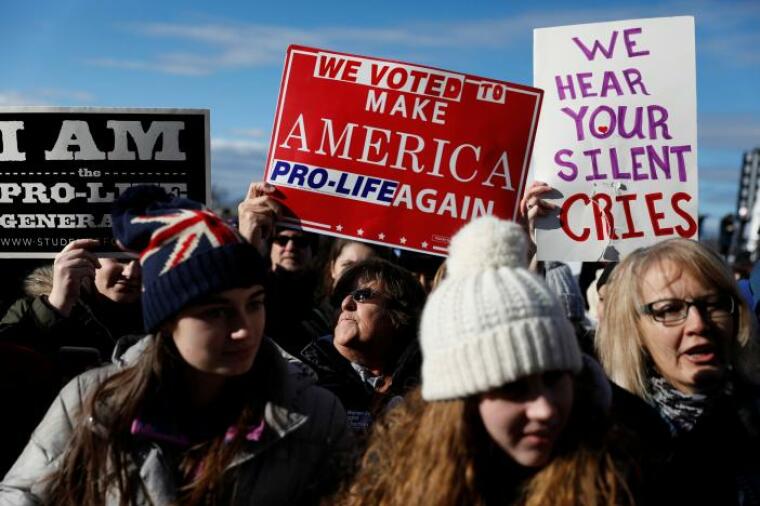House approves bill banning abortions after 20 weeks into pregnancy

The U.S. House of Representatives has approved the legislation known as the Pain Capable Unborn Child Protection Act, which aims to ban abortions after 20 weeks into pregnancy.
The bill, sponsored by Rep. Trent Franks (R-AZ), was passed by the House on Tuesday by a vote of 237–189, according to Life Site News. Three Democrats voted in favor of the measure, while two Republicans opposed it.
The measure contains exceptions for cases of rape and incest, and it requires the abortionist to file a medical report with a state or federal agency saying an act of rape or incest conceived the child before performing the procedure.
Those who are found to be in violation of the law could face five years in prison, but the mothers who obtain such procedures would not be prosecuted.
The White House has released a statement confirming that President Donald Trump will sign the bill into law if it reaches his desk in its current form.
"The United States is currently out of the mainstream in the family of nations, in which only seven out of 198 nations allow elective abortions after 20 weeks of pregnancy," the statement said.
"The bill, if enacted into law, would help to facilitate the culture of life to which our Nation aspires," it added.
A similar measure passed the U.S. House in 2013 and 2015, but it never passed the U.S. Senate. The same fate awaits the bill this year as it needs 60 votes to pass the Senate, where Republicans only have a 52–48 majority.
During the debate on Tuesday, Republicans argued that there is scientific evidence to support the assertion that unborn babies are capable of feeling pain 20 weeks after fertilization.
"These unborn babies are feeling pain. They suffer. That is really hard to hear and really hard to say," said House Speaker Paul Ryan (R-Wis.).
Rep. Karen Handel (R-GA) asserted that unborn babies "can hear music," and "they can even respond to human voices." "This bill reflects today's medical understanding about a baby's ability to feel pain," she added.
Rep. Phil Roe (R-TN), a former OB/GYN who has delivered nearly 5,000 babies, insisted that the unborn child is "living, feeling human being."
Democrats, however, described the assertion as "junk science." The American Congress of Obstetricians and Gynecologists has claimed that fetuses are not capable of feeling pain before at least 24 weeks of development.
The group's chief executive officer, Hal Lawrence, explained in an interview that there is "overwhelming" evidence that unborn babies younger than 24 weeks have reflex activity but lack the neurological development to sense pain. "They can't tell what it is. If you can't interpret it, it can't hurt," he contended.
The 20-week ban is currently in effect in 16 states, namely, Ohio, Texas, Nebraska, Idaho, Oklahoma, Alabama, Georgia, Louisiana, Arkansas, North Dakota, South Dakota, West Virginia, Wisconsin, South Carolina, Kentucky and Kansas.
 Christians don't have to affirm transgenderism, but they can’t express that view at work: tribunal
Christians don't have to affirm transgenderism, but they can’t express that view at work: tribunal Archaeology discovery: Medieval Christian prayer beads found on Holy Island
Archaeology discovery: Medieval Christian prayer beads found on Holy Island Presbyterian Church in America votes to leave National Association of Evangelicals
Presbyterian Church in America votes to leave National Association of Evangelicals Over 50 killed in 'vile and satanic' attack at Nigerian church on Pentecost Sunday
Over 50 killed in 'vile and satanic' attack at Nigerian church on Pentecost Sunday Ukrainian Orthodox Church severs ties with Moscow over Patriarch Kirill's support for Putin's war
Ukrainian Orthodox Church severs ties with Moscow over Patriarch Kirill's support for Putin's war Islamic State kills 20 Nigerian Christians as revenge for US airstrike
Islamic State kills 20 Nigerian Christians as revenge for US airstrike Man who served 33 years in prison for murder leads inmates to Christ
Man who served 33 years in prison for murder leads inmates to Christ


 Nigerian student beaten to death, body burned over ‘blasphemous’ WhatsApp message
Nigerian student beaten to death, body burned over ‘blasphemous’ WhatsApp message 'A new low': World reacts after Hong Kong arrests 90-year-old Cardinal Joseph Zen
'A new low': World reacts after Hong Kong arrests 90-year-old Cardinal Joseph Zen Iran sentences Christian man to 10 years in prison for hosting house church worship gathering
Iran sentences Christian man to 10 years in prison for hosting house church worship gathering French Guyana: Pastor shot dead, church set on fire after meeting delegation of Evangelicals
French Guyana: Pastor shot dead, church set on fire after meeting delegation of Evangelicals ‘Talking Jesus’ report finds only 6% of UK adults identify as practicing Christians
‘Talking Jesus’ report finds only 6% of UK adults identify as practicing Christians Mission Eurasia ministry center blown up in Ukraine, hundreds of Bibles destroyed: 'God will provide'
Mission Eurasia ministry center blown up in Ukraine, hundreds of Bibles destroyed: 'God will provide' Church holds service for first time after ISIS desecrated it 8 years ago
Church holds service for first time after ISIS desecrated it 8 years ago Burger King apologizes for 'offensive campaign' using Jesus' words at the Last Supper
Burger King apologizes for 'offensive campaign' using Jesus' words at the Last Supper Uganda: Muslims abduct teacher, burn him inside mosque for praying in Christ’s name
Uganda: Muslims abduct teacher, burn him inside mosque for praying in Christ’s name